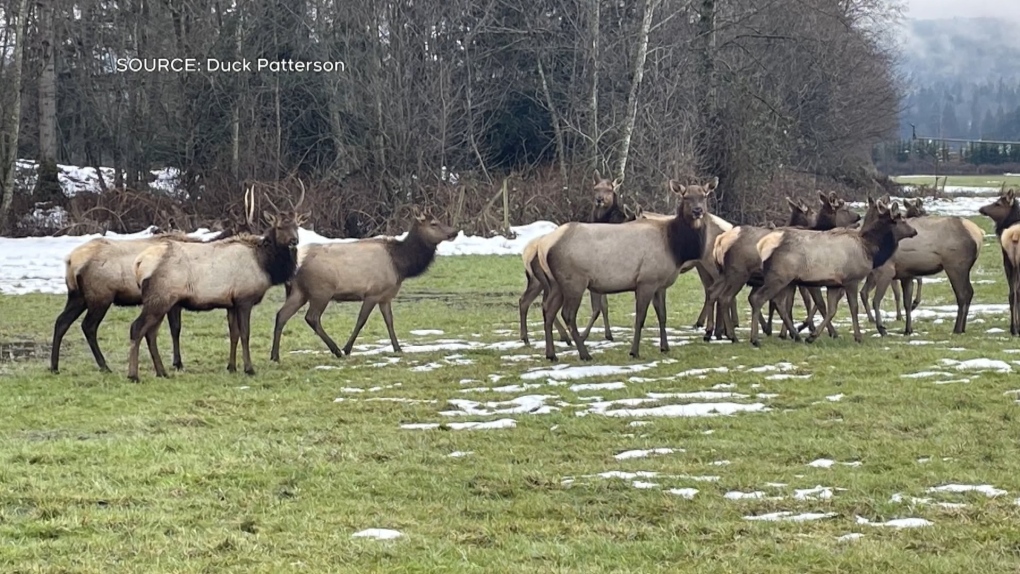Vancouver Island farmers struggle to deal with threatened elk species
 (Duck Patterson)
(Duck Patterson)
Farmers in the Cowichan Valley are losing crops and dealing with property and field damage caused by Roosevelt Elk, which have become a regular fixture on some farms in the area.
The threatened species typically moves to lower elevations during the winter months searching for more plentiful food, but in the last few years, in the Duncan area, some herds have been staying year-round on farmland.
In North Oyster, where Howie Davis has farmed cattle for more than 50 years, a herd of 12 elk showed up in December four years ago. Fortunately for him, they've so far always left by February or March.
"The herds are expanding every year," said Davis.
In the few months the elk are on the farm, Davis said they cause a lot of damage, knocking down fences, tearing the hay fields up with their hooves and eating whatever hay is growing over the winter "right down to nothing."
The elk damage to the hay fields has reduced the number of harvests from four to three in a season, said Davis.
"That’s one crop you don’t get to sell, less income," he said. "[The provincial government has] been compensating me for that … not to what it costs."
A University of Alberta research project intended to reduce human-elk conflict in the Cowichan Valley started in August 2021.
The team has set up multiple trail cameras in the valley to gather data on the herds' numbers and movements.
"To implement any sort of management strategies we need to have a good understanding of what’s happening with the population, how many are there, where are they on the landscape and how are they interacting with human infrastructure?" said Kate Rutherford, a masters student at the University of Alberta.
Rutherford says the provincial government has put a lot of effort into increasing the elk herds in the Cowichan Valley to create a healthy, sustainable population, which seems to have paid off.
"Everyone wants the population to be at healthy levels," she said.
"There’s also that balance, right, with maintaining a healthy population size but also minimizing the occurrence of human-elk conflict, which is going to increase as urbanization increases," she added.
Researchers are also planning to test deterrents to keep elk out of farms.
"We plan to broadcast predator vocalization on the perimeter of these fields where we’re currently monitoring elk using camera traps, and they will be broadcasted when triggered by animal movement," said Rutherford.
The team is also asking landowners in the area to contribute to their research by reporting elk sightings to them either through the iNaturalist app or by emailing the team directly at rooselk@ualberta.ca
The researchers hope to share their work with farmers and the provincial government as way to help with the management of Roosevelt Elk.
CTVNews.ca Top Stories

'I just can't believe that it took so long': Body found in wreckage 3 months after deadly fire
A man accused of arson in a January Old Strathcona apartment fire is expected to be charged with manslaughter after a body was discovered in the burned building late last month.
No proof man lied to brother about number of kittens born in litter, B.C. tribunal rules
A man was denied a $5,000 payout from his brother after a B.C. tribunal dismissed his claim disputing how many kittens were born in a litter.
Work stoppage possible as WestJet issues lockout notice to maintenance engineers' union
A lockout notice issued by WestJet to a union representing aircraft maintenance engineers could result in a work stoppage next week.
Quebec police hand out hundreds of tickets to Hells Angels and other bikers before 'first run' meeting
Quebec provincial police handed out hundreds of fines to Hells Angels members and other supporting motorcycle clubs who met for their 'first run' in a small town near Sherbrooke, Que.
Auston Matthews skates ahead of Game 7, status unclear with season on the line
Auston Matthews was back on the ice with his teammates Saturday.
Russia puts Ukrainian President Zelenskyy on its wanted list
Russia has put Ukrainian President Volodymyr Zelenskyy on its wanted list, Russian state media reported Saturday, citing the interior ministry’s database.
Snakes almost on a plane: U.S. TSA discovers a bag with small snakes in passenger's pants
According to an X post by the Transportation Security Administration, officers at the Miami International Airport found the small bag of snakes hidden in a passenger's trousers on April 26 at a checkpoint.
A Chinese driver is praised for helping reduce casualties in a highway collapse that killed 48
A Chinese truck driver was praised in local media Saturday for parking his vehicle across a highway and preventing more cars from tumbling down a slope after a section of the road in the country's mountainous south collapsed and killed at least 48 people.
Feds hope to table foreign interference legislation next week: LeBlanc
Democratic Institutions Minister Dominic LeBlanc says he plans to table legislation this week to help the federal government address foreign interference, but he wouldn't say whether the proposal will include a foreign agent registry.
































